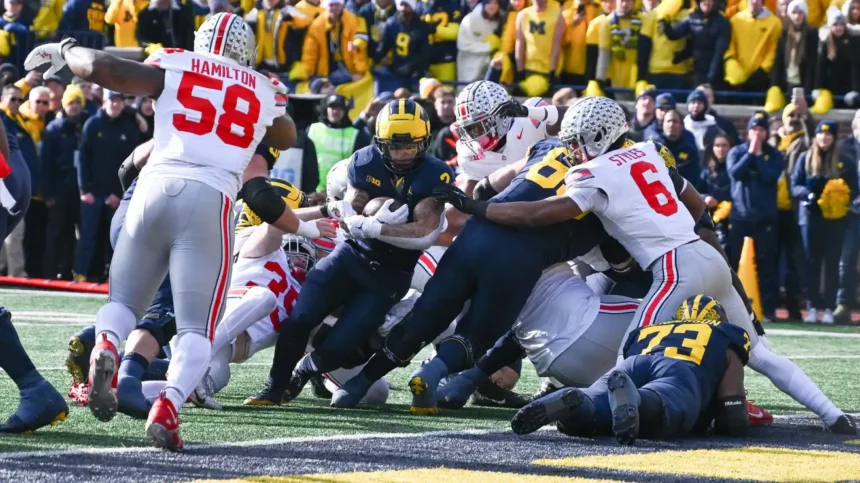ESPN was left out in the cold when the Big Ten inked a large seven-year, $7 billion media rights agreement with Fox, CBS, and NBC last year. However, ESPN would be the biggest winners if championship weekend goes wild and Michigan and Ohio State are fortunate enough to be in the College Football Playoff and get to face each other again.
Here in college football, impossibilities are commonplace.
The statistics from Michigan’s victory over Ohio State last weekend are in, and as usual, they made history. With an average viewership of 19.1 million on Fox, Saturday’s matchup was the most-watched college football game of the 2023 regular season, according to The Athletic. Since 2011, when LSU-Alabama averaged 20 million viewers, the contest was the most-watched regular-season game on any network. Additionally, it was the highest-watched college football regular-season match on Fox history.
FOX has been the fortunate network when it comes to Michigan and their dramatic season, having shown the team’s final three games—against Penn State, Maryland, and Ohio State. But since everyone was able to see the Wolverines this season, they have aired on Peacock, NBC, The Big Ten Network, CBS, and FOX.
The most recent rankings for the College Football Playoffs were revealed on Tuesday. Georgia, Michigan, Washington, and Florida State are on the list. Oregon, Ohio State, Texas, and Alabama come next because Saturday will decide a lot before the committee chooses the four teams that advance to the championship game.
What will happen if Georgia is upset by Alabama? Would they be present?
Does Michigan’s loss to Iowa mean that despite their victories against Penn State and Ohio State—two teams ranked in the top 10—they are eliminated?
Does Oregon’s victory over Washington signal the end for the Huskies? Or would the Ducks’ victory make them the only team from the Pac-12?
There isn’t a starter quarterback for the Seminoles. Can they defeat other teams that appear to be “more deserving” and still be considered as worthy contenders if they win the ACC Championship?
Given that Texas defeated Alabama, where does Texas figure into all of this if Georgia defeats Alabama?
This is what happens when four teams from four separate conferences go into championship weekend unbeaten, and the four teams behind them are all excellent one-loss teams.
Someone may certainly experience emotional distress.
But because the network that no longer benefits from airing the Big Ten’s media ratings would likely perform well if Michigan and Ohio State ended up in the final four, this is probably why the executives at ESPN/ABC are hoping for some upsets on Saturday.
“The largest audience for the rivalry since their No. 1 vs. No. 2 meeting in 2006 (21.04 million) and the second-largest on record” watched the Wolverines and Buckeyes, according to SportsMediaWatch. In addition, the rivalry’s 9.0 rating is the highest since its No. 2 vs. No. 3 showdown in 2016 (9.4) and ranks third highest after that year and 2006 (13.0). (That doesn’t include a 1995 match that received a 10.5 rating when it aired locally on ABC.) The Wolverines’ victory brought in the highest total college football viewership during the regular season in 12 years—since a No. 1 vs. No. 2 battle between LSU and Alabama in 2011 (20.01 million). The game peaked at 22.90 million from 3:30 to 3:45 p.m. ET.
Whatever your opinion of Jim Harbaugh and Michigan, or how unappealing the idea of enjoying anything from Ohio makes you feel, the statistics show that fans enjoy seeing these two teams play.
When Deion Sanders and Colorado were the talk of college football earlier this year, their 42-6 loss against Oregon on ABC turned into the season’s most-watched game with 10.03 million viewers. The excitement surrounding that matchup was nearly doubled by Michigan and Ohio State. It’s extremely doubtful that we will witness the Wolverines and Buckeyes play each other again in a few weeks, as this has never occurred before. However, ESPN would be ecstatic to hear that if it did.









